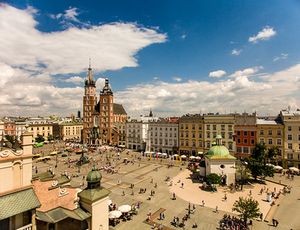
An international consortium has presented the results of the world’s largest study of urban microbiome conducted so far. The project involved sequencing and analysis of samples collected in 60 cities all over the world and resulted in a complex analysis and taxonomic identification of all microorganisms found in the samples. The researchers included Dr hab.
According to Prof. Christopher Mason, the main author of an article recently published in Cell and accompanied by a paper in Microbiome every city has its own molecular fingerprint depending on the microbes living there, and it would be possible to determine a person’s home city with a 90 percent accuracy rate, based on the material taken from the soles of a shoe.
The studies were based on the analysis of 4,728 samples collected in three years from cities on 6 continents. The results take into account the local markers of resistance to antimicrobial agents and constitute the first systematic global catalogue of urban microorganisms’ ecosystem. Besides unique “fingerprints” of microbiomes of different cities, the analysis has revealed the basic set of 31 species that were found in 97 percent of samples from the studied urban areas. The researchers have identified 4,246 known species of urban microorganisms, but they also concluded that further collection of samples will lead to the occurrence of species that have not been found before. This reflects the unique potential of studies related to the diversity and biological functions of microorganisms inhabiting urban environment.
The project of the consortium started in 2013 when Prof. Christopher Mason started to gather and analyse microbe samples in the New York City Subway. After publishing the first results he was contacted by scientists from all over the world who wanted to conduct similar research in their cities. In 2015 the global interest in his research inspired Prof. Mason to create the international consortium MetaSUB (Metagenomics and Metadesign of Subways and Urban Biomes). One of the first researchers who joined it was Dr hab.
Each year, the MetaSUB organises the global City Sampling Day (gCSD), which takes place annually on 21 June. Kraków joined the project in 2020 when volunteers collected samples from surfaces in selected trams and tram stops. Additional samples were taken using an air sampler in tunnels near the main railway station. The project will be continued this year, and based on the results from both years Dr hab.
The MetaSUB consortium is running other research projects, including a complex microbiological analysis of the urban spaces and population of mosquitos before and after the Summer Olympics in Rio de Janeiro in 2016. Another project, which started in 2020, focuses on the occurrence of SARS-CoV-2 and other coronaviruses in domestic cats. The scientists are also planning to conduct research related to the 2021 Tokyo Olympics. Hence, the consortium has extended its activity to collect samples not only from hard surfaces, but also from air, water, and sewage.





